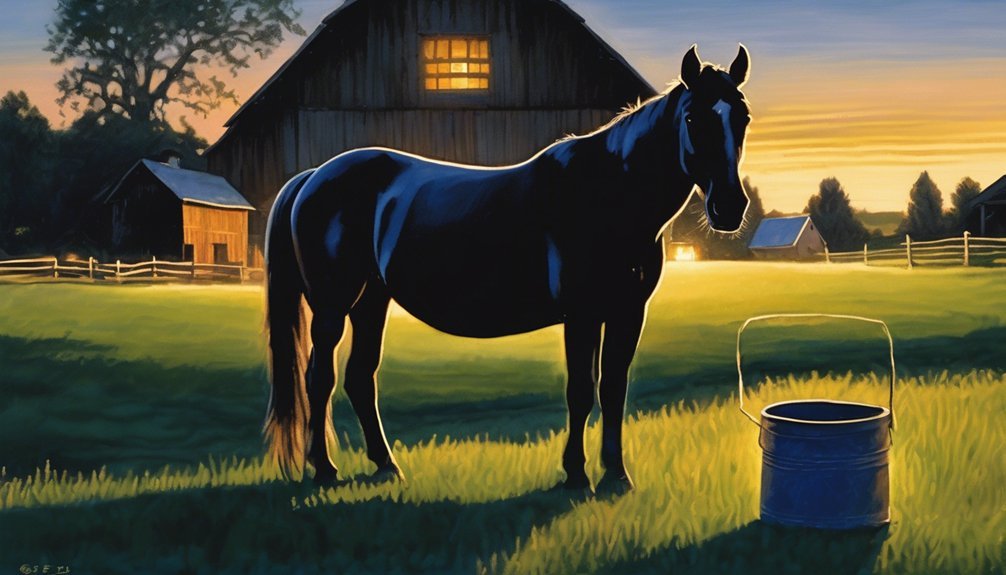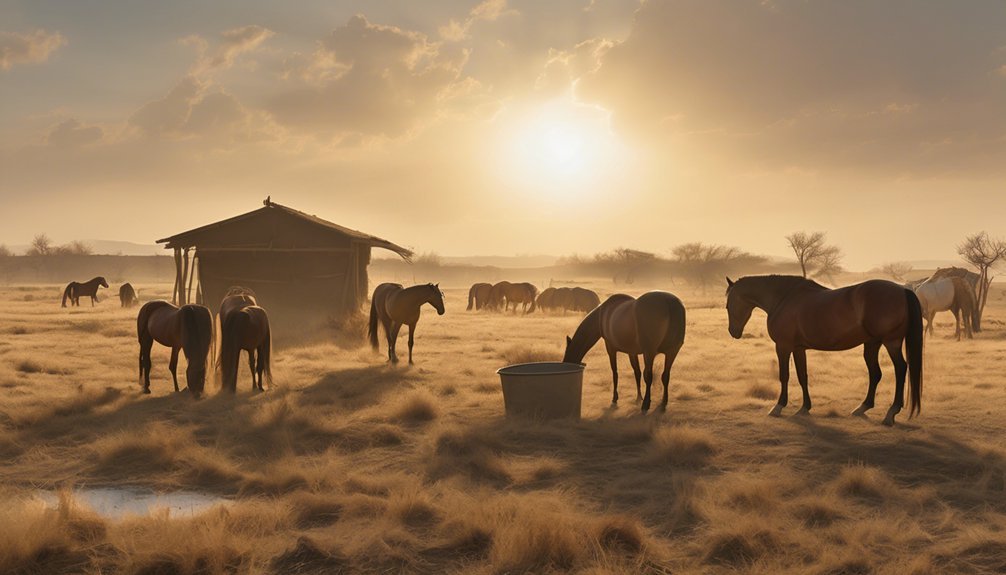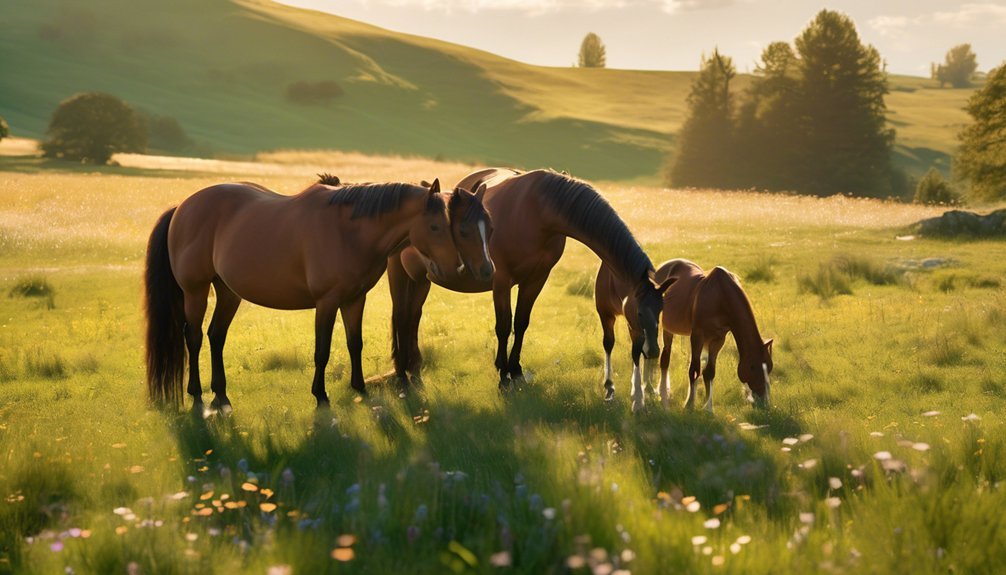
Feeding horses at night can align with their natural grazing habits, potentially improving digestive health and reducing stress. However, it also presents challenges, such as limited visibility for monitoring health and the risk of attracting unwanted pests. Balancing these factors is essential for maintaining your horse's overall well-being. But what specific considerations should you keep in mind when deciding on a nighttime feeding schedule? Let's explore the benefits and drawbacks in more detail.
Key Takeaways
- Nighttime feeding aligns with horses' natural grazing habits, promoting better digestion and overall well-being.
- It reduces stress and anxiety as horses feel more comfortable in low-light conditions.
- Regular nighttime access to forage helps maintain a steady intake, aiding in weight management.
- Challenges include limited visibility for health monitoring and increased risk of attracting pests and wildlife.
- Effective pest control is crucial to prevent health risks associated with leftover food attracting critters.
Understanding Horses' Natural Grazing Habits

Understanding horses' natural grazing habits is crucial for their health and well-being, especially when considering nighttime feeding.
Horses are innate foragers, designed to graze throughout the day and into the night. Their grazing patterns reflect a need for constant access to forage, which helps maintain gut health and prevents colic.
By mimicking their natural foraging behavior, you allow your horse to engage in instinctual feeding activities, promoting both physical and mental well-being.
During the night, horses often feel more secure and relaxed, making it an ideal time to provide access to pasture or hay.
Observing their natural tendencies can guide you in creating a feeding schedule that aligns with their instinctive rhythms, fostering a happier and healthier horse.
Benefits of Nighttime Feeding
Feeding horses at night offers a range of benefits that align with their natural behaviors and needs. By implementing nighttime nutrition into your feeding strategies, you cater to their instinctual grazing patterns.
Horses are crepuscular, meaning they naturally forage during dawn and dusk. Nighttime feeding can reduce stress and anxiety, as they feel more comfortable eating in low-light conditions.
This approach also allows them to maintain a steady intake of forage, promoting better digestion and overall well-being. Additionally, feeding at night can help you manage their weight by controlling caloric intake, as you can monitor their consumption more closely.
Ultimately, this strategy fosters a healthier, happier horse while respecting their innate tendencies.
Potential Digestive Improvements

When horses are fed at night, their digestive health can significantly improve due to their natural behaviors aligning more closely with their feeding schedule.
Horses are instinctive grazers, naturally consuming small amounts throughout the day and night. By providing feed during the night, you're mimicking their grazing patterns, which promotes nighttime digestion and allows for a more consistent intake of nutrients.
This can reduce the risk of digestive issues like colic and ulcers, as their stomachs remain active and processing food. Additionally, feeding at night can help you manage their weight better, as it encourages a steady metabolism.
Challenges of Monitoring Health at Night
While feeding horses at night can enhance their digestive health, it also presents unique challenges in monitoring their well-being. Nighttime monitoring becomes crucial, yet difficult due to limited visibility and potential distractions. You might miss subtle signs of discomfort or distress during those dark hours, making health observations harder to discern.
| Challenge | Impact on Monitoring |
|---|---|
| Limited Visibility | Harder to spot issues |
| Noise Distractions | Can mask health signals |
| Lack of Staff | Less frequent checks |
| Environmental Factors | Affect horse behavior |
| Reduced Interaction | Less bonding opportunities |
Risks of Attracting Pests and Wildlife

Attracting pests and wildlife becomes a significant concern when horses are fed at night, primarily due to the odor and leftover food that can linger in the environment.
When you leave food out, it can draw in unwanted critters, from raccoons to rodents, which may pose health risks to your horses. Effective pest control becomes essential to minimize these risks, but nighttime feeding complicates your efforts.
You might find yourself constantly battling against nature's intruders, impacting both your horse's health and wildlife safety. To keep your horses safe, consider feeding them during daylight hours or cleaning up any remnants promptly.
This way, you can help maintain a peaceful environment while ensuring your horses remain healthy and happy.
Impact on Horse Behavior and Routine
Feeding horses at night can significantly alter their behavior and routine. When you change their feeding schedule, you'll likely notice shifts in their nighttime behavior.
Horses are naturally crepuscular, meaning they're more active during dawn and dusk. Feeding them at night might disrupt their sleep patterns, leading to restlessness or anxiety. You may find that your horse becomes more alert during those hours, anticipating meals instead of settling down.
Additionally, a nighttime feeding routine can interfere with their natural grazing habits, which may affect their overall well-being. Consistency is key; if you're considering this schedule change, be prepared for the behavioral adjustments that might come with it.
Understanding these impacts is crucial for maintaining your horse's comfort and health.
Making the Right Feeding Schedule for Your Horse

When determining the right feeding schedule for your horse, it's essential to consider their unique needs and lifestyle. Each horse has different dietary preferences that can influence their feeding frequency. You'll want to create a routine that aligns with their natural grazing instincts while ensuring they receive adequate nutrition. Here's a simple table to help guide your schedule:
| Time of Day | Feeding Frequency |
|---|---|
| Morning | 1-2 times |
| Afternoon | 1 time |
| Evening | 1-2 times |
| Night | Optional based on needs |
| Adjusted for age | Varies, consult vet |
Frequently Asked Questions
Can Feeding Horses at Night Affect Their Sleep Patterns?
Feeding horses at night can disrupt their nighttime behavior, potentially affecting sleep quality. If you notice changes in their rest patterns, adjusting feeding times might help ensure they get the peaceful sleep they need.
What Type of Feed Is Best for Nighttime Meals?
For nighttime nutrition, consider feed types like high-fiber hay or specially formulated grain mixes. These options provide slow-release energy, maintaining your horse's well-being while promoting digestion and ensuring they feel satisfied through the night.
How Does Nighttime Feeding Impact a Horse's Weight Management?
Imagine your horse nibbling under a starlit sky. Nighttime feeding can disrupt natural grazing habits, complicating weight loss strategies. By managing their intake, you can guide their weight effectively, ensuring they stay healthy and vibrant.
Are There Specific Breeds That Benefit More From Nighttime Feeding?
Certain breeds, like thoroughbreds and performance horses, might benefit from night feeding due to their high energy needs. Night feeding aligns better with their natural grazing instincts, promoting better digestion and overall health tailored to breed preferences.
Do Horses Prefer Eating at Night Over During the Day?
Horses, like shadows in the moonlight, often prefer nighttime foraging, reflecting their natural behaviors. They're crepuscular, meaning they're naturally inclined to eat more during twilight hours, making nighttime feeding potentially more satisfying for them.
Conclusion
In conclusion, feeding your horse at night can be a game-changer, aligning with their natural instincts and potentially improving their digestive health. However, you must carefully weigh the benefits against the challenges, like monitoring their health and the risk of attracting pests. By tailoring a feeding schedule that suits your horse's needs, you can create a harmonious balance that enhances their well-being. After all, a happy horse is a majestic creature that embodies the spirit of the night.





